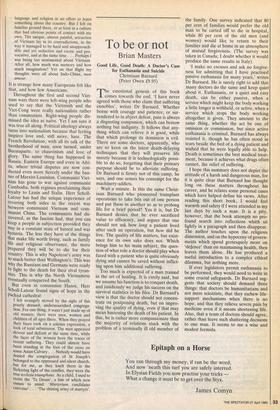To be or not
Brian Masters
Good Life, Good Death: A Doctor's Case for Euthanasia and Suicide Christiaan Barnard (Peter Owen £9.95) rr he emotional genesis of this book 1 comes towards the end. 'I have never agreed with those who claim that suffering ennobles', writes Dr Barnard. Whether borne with courage and patience, or sur- rendered to in abject defeat, pain is always a disgusting companion, which can bestow nothing but indignity. It follows that any- thing which can relieve it is good, while that which prolongs its dominion is evil. There are some doctors, apparently, who are so keen on the latest death-delaying techniques that they will preserve life merely because it is technologically possi- ble to do so, forgetting that their primary purpose should be to alleviate suffering. Dr Barnard is firmly not of this camp, he says, and one senses his contempt for the machinery-addicts.
Wait a minute. Is this the same Christ- iaan Barnard who pioneered transplant operations to take bits out of one person and put them in another so as to prolong life for a brief period? Yes it is, but Dr Barnard denies that he ever sacrificed value to efficiency, and argues that one should not ask how long a patient lived after such an operation, but how did he live. The quality of life matters, but exist- ence for its own sake does not. Which brings him to his main subject, the ques- tion of what role a doctor should play when faced with a patient who is quite obviously dying and cannot be saved without inflict- ing upon him additional suffering.
Too much is expected of a man trained in the art of healing. It is rarely said, but we assume his function is to conquer death, and insidiously we judge his success on the survival statistics in his files. Dr Barnard's view is that the doctor should not concen- trate on postponing death, but on impro- ving the quality of dying, even if that may mean hastening the death of his patient. In this, he is rather more compassionate than the majority of relations stuck with the problem of a terminally ill old member of the family. One survey indicated that 80 per cent of families would prefer the old man to be carted off to die in hospital, while 80 per cent of the old men (and women) would like to return to their families and die at home in an atmosphere of mutual forgiveness. (The survey was taken in Canada; I doubt whether it would produce the same results in Italy).
'I make no excuses and ask no forgive- ness for admitting that I have practised passive euthanasia for many years,' writes Dr Barnard. He is surely right to add that many doctors do the same and keep quiet about it. Euthanasia, or a quiet and easy death, can be either passive, when a service which might keep the body working a little longer is withheld, or active, when a service which stops the body working altogether is given. They amount to the same thing, whether the act be one of omission or commission, but since active euthanasia is criminal, Barnard has always resisted it, though he has often stood in tears beside the bed of a dying patient and wished that he were legally able to help. Death is sometimes the best medical treat- ment, because it achieves what drugs often cannot, the relief of suffering.
I hope this summary does not depict the attitude of a harsh and dangerous man, for it is quite clear that Barnard has thought long on these matters throughout his career, and he relates some personal cases which have helped define his views. After reading this short book, I would feel warmth and safety if I were attended in my last days by such a man. It is a pity, however, that the book attempts no pro- found search into reflections whin sit lightly in a paragraph and then disappear. The author touches upon the religious dimension, and on the hypocrisy of govern- ments which spend grotesquely more on 'defence' than on maintaining health, then leaves them alone. He has produced a useful introduction to a complex ethical dilemma, but nothing more.
If ever legislators permit euthanasia to be performed, they would need to write in some crucial safeguards. Dr Barnard sug- gests that society should demand three things: that doctors be humanitarians and not mere scientists; that they eschew life- support mechanisms when there is no hope; and that they relieve severe pain by
medicine even if it means shortening life. Also, that a team of doctors should agree, rather than leave such shattering decisions to one man. It seems to me, a wise and modest formula.


















































 Previous page
Previous page